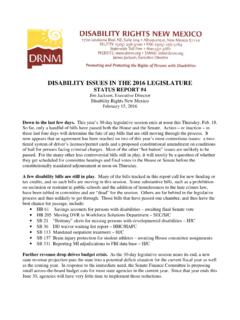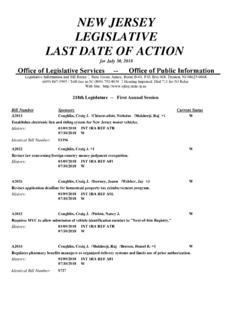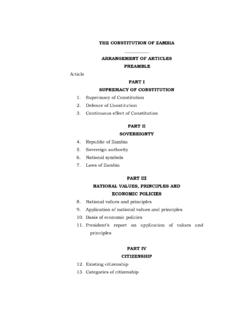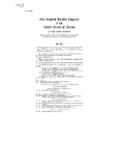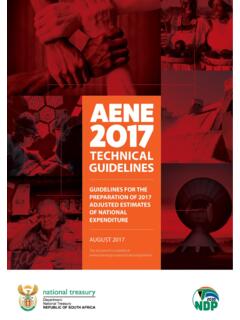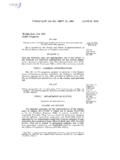Transcription of CONSTITUTION OF THE REPUBLIC OF FIJI
1 CONSTITUTION OF THE REPUBLIC OF FIJICONSTITUTIONOFTHE REPUBLIC OF FIJIiCONSTITUTION OF THE REPUBLIC OF FIJICONTENTS_____PREAMBLECHAPTER 1 THE STATE 1. The REPUBLIC of Fiji 2. Supremacy of the CONSTITUTION 3. Principles of constitutional interpretation 4. Secular State 5. CitizenshipCHAPTER 2 BILL OF RIGHTS 6. Application 7. Interpretation of this Chapter 8. Right to life 9. Right to personal liberty 10. Freedom from slavery, servitude, forced labour and human trafficking 11. Freedom from cruel and degrading treatment 12. Freedom from unreasonable search and seizure 13. Rights of arrested and detained persons 14. Rights of accused persons 15. Access to courts or tribunals 16. Executive and administrative justice 17. Freedom of speech, expression and publication 18. Freedom of assembly 19. Freedom of association 20. Employment relations 21. Freedom of movement and residence 22. Freedom of religion, conscience and belief 23.
2 Political rights 24. Right to privacy 25. Access to information 26. Right to equality and freedom from discrimination 27. Freedom from compulsory or arbitrary acquisition of property 28. Rights of ownership and protection of iTaukei, Rotuman and Banaban lands 29. Protection of ownership and interests in land 30. Right of landowners to fair share of royalties for extraction of minerals 31. Right to education 32. Right to economic participation 33. Right to work and a just minimum wageii 34. Right to reasonable access to transportation 35. Right to housing and sanitation 36. Right to adequate food and water 37. Right to social security schemes 38. Right to health 39. Freedom from arbitrary evictions 40. Environmental rights 41. Rights of children 42. Rights of persons with disabilities 43. Limitation of rights under states of emergency 44. Enforcement 45. Human Rights and Anti-Discrimination CommissionCHAPTER 3 PARLIAMENTPart A LEGISLATIVE AUTHORITY 46.
3 Legislative authority and power of Parliament 47. Exercise of legislative powers 48. Presidential assent 49. Coming into force of laws 50. Regulations and similar laws 51. Parliamentary authority over international treaties and conventionsPart B COMPOSITION 52. Members of Parliament 53. Proportional representation system 54. Composition of Parliament 55. Voter qualification and registration 56. Candidates for election to Parliament 57. Candidates who are public officers 58. Term of Parliament 59. Writ for election 60. Date of nomination 61. Date of polling 62. Early dissolution of Parliament 63. Vacation of seat of member of Parliament 64. Next candidate to fill vacancy 65. Vacancies in membership 66. Court of Disputed Returns 67. Sessions of Parliament 68. Quorum 69. Votingiii 70. Committees 71. Standing orders 72. Petitions, public access and participation 73. Powers, privileges, immunities and discipline 74.
4 Power to call for evidencePart C INSTITUTIONS AND OFFICES 75. Electoral Commission 76. Supervisor of Elections 77. Speaker and Deputy Speaker of Parliament 78. Leader of the Opposition 79. Secretary-General to Parliament 80. RemunerationsCHAPTER 4 THE EXECUTIVEPart A THE PRESIDENT 81. The President of Fiji 82. President acts on advice 83. Qualification for appointment 84. Appointment of President 85. Term of office and remuneration 86. Oath of office 87. Resignation 88. Chief Justice to perform functions in absence of President 89. Removal from officePart B CABINET 90. Responsible Government 91. Cabinet 92. Office of the Prime Minister 93. Appointment of Prime Minister 94. Motion of no confidence 95. Appointment of Ministers 96. Attorney-GeneralCHAPTER 5 JUDICIARYPart A COURTS AND JUDICIAL OFFICERS 97. Judicial authority and independence 98. Supreme Courtiv 99.
5 Court of Appeal 100. High Court 101. Magistrates Court 102. Other courts 103. Court rules and procedures 104. Judicial Services Commission 105. Qualification for appointment 106. Appointment of Judges 107. Other appointments 108. Judicial department employees 109. Oath of office 110. Term of office 111. Removal of Chief Justice and President of the Court of Appeal for cause 112. Removal of judicial officers for cause 113. Remuneration of judicial officersPart B INDEPENDENT JUDICIAL AND LEGAL INSTITUTIONS 114. Independent Legal Services Commission 115. Fiji Independent Commission Against Corruption 116. Solicitor-General 117. Director of Public Prosecutions 118. Legal Aid Commission 119. Mercy Commission 120. Public Service Disciplinary Tribunal 121. Accountability and Transparency Commission 122. Existing appointmentsCHAPTER 6 STATE SERVICESPart A PUBLIC SERVICE 123.
6 Values and principles 124. Public officers must be citizens 125. Public Service Commission 126. Functions of the Public Service Commission 127. Permanent secretaries 128. Appointment of ambassadorsPart B DISCIPLINED FORCE 129. Fiji Police Force 130. Fiji Corrections Service 131. REPUBLIC of Fiji Military ForcesvPart C CONSTITUTIONAL OFFICES COMMISSION 132. Constitutional Offices Commission 133. Functions of the Constitutional Offices CommissionPart D GENERAL PROVISIONS RELATING TO PUBLIC OFFICES 134. Application 135. Terms and conditions of office 136. Remuneration and allowances 137. Removal from office for cause 138. Performance of functions of commissions and tribunalsCHAPTER 7 REVENUE AND EXPENDITURE 139. Raising of revenue 140. Consolidated Fund 141. Appropriations to be authorised by law 142. Authorisation of expenditure in advance of appropriation 143. Appropriation and taxing measures require ministerial consent 144.
7 Annual budget 145. Guarantees by Government 146. Public moneys to be accounted for 147. Standing appropriation of Consolidated Fund for payment of certain salaries and allowances 148. Standing appropriation of Consolidated Fund for other purposesCHAPTER 8 ACCOUNTABILITY Part A CODE OF CONDUCT 149. Code of conductPart B FREEDOM OF INFORMATION 150. Freedom of informationPart C AUDITOR-GENERAL 151. Auditor-General 152. Functions of Auditor-GeneralPart D RESERVE BANK OF FIJI 153. Reserve Bank of FijiviCHAPTER 9 EMERGENCY POWERS 154. State of emergencyCHAPTER 10 IMMUNITY 155. Immunity granted under the CONSTITUTION of 1990 continues 156. Immunity granted under the Limitation of Liability for Prescribed Political Events Decree 2010 continues 157. Further immunity 158. Immunity entrenchedCHAPTER 11 AMENDMENT OF CONSTITUTION 159. Amendment of CONSTITUTION 160. Procedure for amendment 161.
8 Amendments before 31 December 2013 CHAPTER 12 COMMENCEMENT, INTERPRETATION, REPEALS AND TRANSITIONALPart A SHORT TITLE AND COMMENCEMENT 162. Short title and commencementPart B INTERPRETATION 163. InterpretationPart C REPEALS 164. RepealsPart D TRANSITIONAL 165. Office of the President 166. Prime Minister and Ministers 167. Public or Constitutional officers 168. Finance 169. Functions of Parliament and Speaker 170. Elections 171. Succession of institutions 172. Preservation of rights and obligations 173. Preservation of laws 174. Judicial proceedings SCHEDULE_____1 PREAMBLEWE, THE PEOPLE OF FIJI, RECOGNISING the indigenous people or the iTaukei, their ownership of iTaukei lands, their unique culture, customs, traditions and language;RECOGNISING the indigenous people or the Rotuman from the island of Rotuma, their ownership of Rotuman lands, their unique culture, customs, traditions and language; RECOGNISING the descendants of the indentured labourers from British India and the Pacific Islands, their culture, customs, traditions and language; andRECOGNISING the descendants of the settlers and immigrants to Fiji, their culture, customs, traditions and language, DECLARE that we are all Fijians united by common and equal citizenry; RECOGNISE the CONSTITUTION as the supreme law of our country that provides the framework for the conduct of Government and all Fijians.
9 COMMIT ourselves to the recognition and protection of human rights, and respect for human dignity; DECLARE our commitment to justice, national sovereignty and security, social and economic wellbeing, and safeguarding our environment,HEREBY ESTABLISH THIS CONSTITUTION FOR THE REPUBLIC OF 1 THE STATEThe REPUBLIC of Fiji 1. The REPUBLIC of Fiji is a sovereign democratic State founded on the values of (a) common and equal citizenry and national unity;(b) respect for human rights, freedom and the rule of law;(c) an independent, impartial, competent and accessible system of justice;(d) equality for all and care for the less fortunate based on the values inherent in this section and in the Bill of Rights contained in Chapter 2;(e) human dignity, respect for the individual, personal integrity and responsibility, civic involvement and mutual support;(f) good governance, including the limitation and separation of powers;(g) transparency and accountability; and(h) a prudent, efficient and sustainable relationship with of the CONSTITUTION 2.
10 (1) This CONSTITUTION is the supreme law of the State. (2) Subject to the provisions of this CONSTITUTION , any law inconsistent with this CONSTITUTION is invalid to the extent of the inconsistency. (3) This CONSTITUTION shall be upheld and respected by all Fijians and the State, including all persons holding public office, and the obligations imposed by this CONSTITUTION must be fulfilled. (4) This CONSTITUTION shall be enforced through the courts, to ensure that (a) laws and conduct are consistent with this CONSTITUTION ;(b) rights and freedoms are protected; and(c) duties under this CONSTITUTION are performed.(5) This CONSTITUTION cannot be abrogated or suspended by any person, and may only be amended in accordance with the procedures prescribed in Chapter 11. (6) Any attempt to establish a Government other than in compliance with this CONSTITUTION shall be unlawful, and (a) anything done to further that attempt is invalid and of no force or effect; and(b) no immunities can lawfully be granted under any law to any person in respect of actions taken or omitted in furtherance of such an of constitutional interpretation3.




